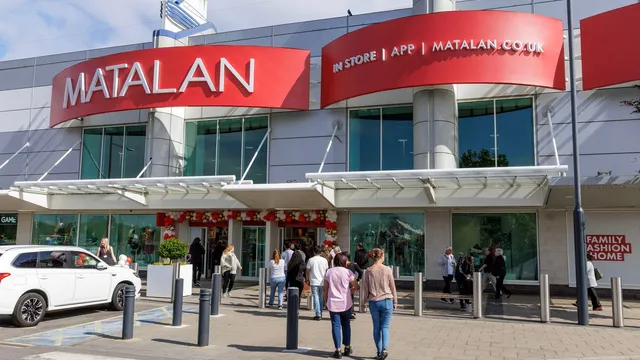
Matalan invests £25 million to revamp and expand its store network
2025-06-09 11:15- Matalan is investing £25 million to enhance its UK store network, indicating a strong commitment to physical retail.
- The company plans to open 10 new stores this year and refurbish 30 existing locations, modernizing customer experience.
- This strategy follows a change in ownership and aims to adapt to evolving consumer expectations and strengthen community ties.
Express your sentiment!
Insights
Matalan, a prominent fashion and homeware chain in the UK, has embarked on a significant investment plan, announcing a £25 million initiative to enhance and expand its store presence across the country. This strategic move is aimed at reinforcing the brand's commitment to physical retail, especially as it continues to adapt to the evolving retail landscape. The company plans to launch 10 new and relocated stores this year, focusing on regions such as London, Essex, Hampshire, and Northern Ireland, where it aims to better connect with local communities and improve accessibility for customers. Moreover, as part of the investment, Matalan is committed to refurbishing 30 existing stores, a process that aims to both modernize the shopping experience and improve overall customer satisfaction. Changes that shoppers can expect include more clearly defined departments within the stores, relocation of fitting rooms and checkouts to centralized areas, and the introduction of modernized checkout systems featuring faster self-service tills. This refurbished approach is expected to enhance the shopping environment, making it more streamlined and user-friendly for Matalan's diverse customer base. Additionally, Matalan is embracing technology in tandem with its physical store enhancements by planning to launch a new app that will facilitate shopping and loyalty rewards for its customers. This innovative step is indicative of Matalan's broader strategy to merge traditional retail with emerging digital trends, creating a more cohesive shopping experience that resonates with modern consumers. The recent history of Matalan has seen significant changes, particularly with new ownership coming into effect at the start of 2023. A group of lenders took control of the company from its founder, John Hargreaves, marking a critical transition phase. Under the leadership of Invesco, Man GLG, Napier Park, and Tresidor, Matalan is now poised to navigate the challenges and opportunities that lie ahead in the retail industry. As a staple in UK retail for nearly 40 years, Matalan's strategic focus on revitalizing its storefronts demonstrates a commitment to maintaining its relevance in a highly competitive market. This investment strategy and the planned upgrades illustrate Matalan's recognition of the importance of physical retail spaces in fostering community connections, while also highlighting the brand's intention to adapt to changing consumer expectations. With approximately 265 stores in operation across the UK and beyond, these developments are expected to positively impact Matalan’s bottom line and potentially lead to a boost in sales as revamped stores have already shown promising performance in terms of sales growth. In summary, Matalan's initiative to invest in store expansion and refurbishment signifies a strong commitment to enhancing customer experiences, solidifying its place in the retail market, and adapting to the shifting landscape of consumer shopping behaviors, thus ensuring long-term sustainability for the brand.
Contexts
The impact of physical stores on retail transformation has been profound, reshaping the landscape of consumer shopping behaviors and experiences. In an era where online shopping has held significant sway, retail spaces have evolved from mere transactional venues to experience-driven environments. This transition underscores the necessity for retail businesses to adapt their strategies in order to attract and retain customers. The presence of physical stores provides essential touchpoints that allow retailers to foster customer relationships, establish brand loyalty, and differentiate themselves from purely digital competitors. Physical locations are not only points of sale but also showcase the brand’s identity, allowing consumers to engage with products and experiences that transcend digital representation. As retailers navigate through the complexities of modern consumerism, leveraging the synergy between physical and online channels has become increasingly important. Omnichannel strategies are now crucial, integrating various shopping platforms to create a seamless experience for consumers. Retailers are investing in technology to enhance in-store experiences, leveraging data analytics to personalize the shopping process and streamline operations. For instance, interactive displays and mobile apps can guide customers to products, offer promotions, or even enable contactless checkouts. This infusion of technology not only improves operational efficiency but also enriches the customer experience, leading to increased satisfaction and retention. Moreover, the role of physical stores extends beyond transactional benefits. They serve as community hubs, facilitating social interactions and brand engagement. Retailers are increasingly recognizing the importance of creating immersive experiences, hosting events, and encouraging community participation in their stores. This shift toward experience-oriented retail has proven effective in humanizing brands, fostering deeper emotional connections with consumers, and ultimately driving foot traffic. As consumers seek authentic interactions, the physical store provides a tangible environment that fosters trust and encourages exploration in ways that online platforms cannot replicate. In conclusion, the impact of physical stores on retail transformation is multifaceted and dynamic. As retailers continue to navigate a post-pandemic landscape and adapt to changing consumer behaviors, it remains imperative for them to rethink the role of physical locations. By integrating technology and curating enriching experiences, these spaces can become vital to a cohesive omnichannel strategy, bridging the gap between online and offline shopping. The evolution of physical retail will not only determine the success of individual retailers but also set the tone for the future of the retail industry as a whole.